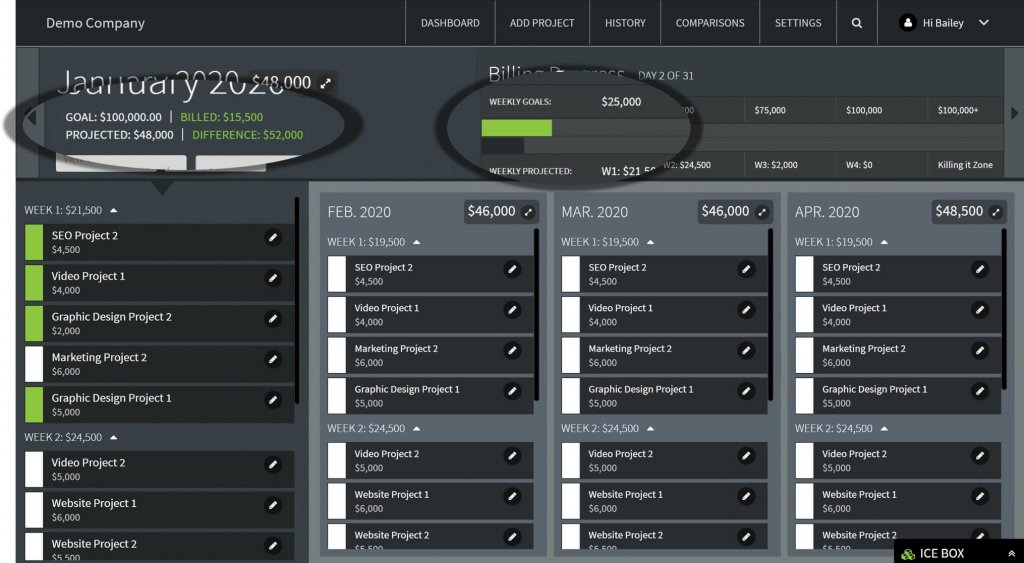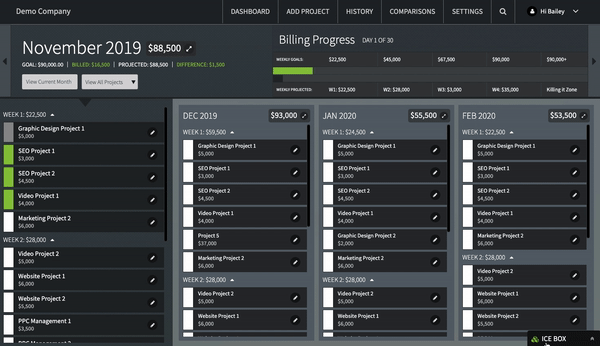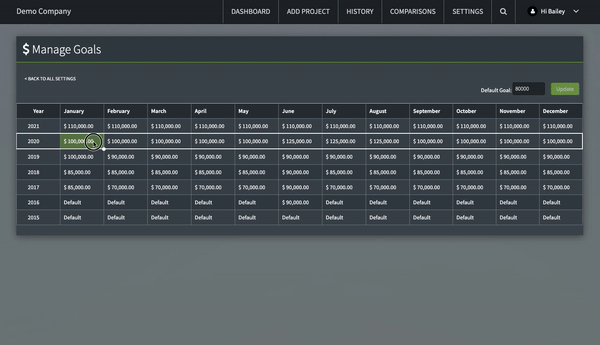-
Goal Setting for Business Development
in Small Business Growth on July 15, 2020
Share with your friends or professional networkWhen I started my digital advertising business, goal setting was one of the hardest things for me as a new entrepreneur. While just picking a number for revenue sounded good, I realized that one number would not be a great indicator of all I was capable of accomplishing. Determining what was realistic while still being aspirational was definitely a challenge. Through research, trial and error, I have landed on goal setting strategies and tools that work for me as a project-based business, and I believe they will work for any growth-minded entrepreneur. In this post, we’ll cover goal setting for business development.
Get Ready with Some Inspiration
The right attitude is essential. Setting goals may be a thorn in your side, so get inspired and learn the value of goal setting by reading quotes or a motivational book. Here are a few quotes that helped me prepare myself for the task:
“Setting goals is the first step in turning the invisible into the visible.” -Tony Robbins
“A goal is a dream with a deadline.” – Napoleon Hill
“Don’t become a wandering generality. Be a meaningful specific.” – Zig Ziglar
“The secret of getting ahead is getting started.” – Mark Twain
Get Set with the Right Mindset
While S.M.A.R.T. goals are a staple of so many business development team’s goal setting strategies, all the elements are not necessarily right for a new entrepreneur or startup. Let’s take a look at the makeup of a S.M.A.R.T. goal to better understand.
It is SPECIFIC. A general goal such as “increase revenue” or “make a lot of money” is not specific enough for goal setting for any purpose. It doesn’t provide any parameters to ensure the goal’s success. Answer these questions to make sure your goal is specific enough:
- What exactly do you want to achieve?
- Why? Give the reasons you have for accomplishing the goal. How will the company benefit? What’s the purpose of the goal?
- Who will be responsible for achieving the goal? Is it an individual or team effort? What is each person’s role?
- Which barriers must you hurdle to achieve the goals? What weaknesses exist that you will need to overcome?
It is MEASURABLE. It’s important to know at any point in time whether you are on track or not, so you can make adjustments to your efforts. But you can’t improve what you don’t measure. A measurable goal can incorporate almost any data set, but should definitely answer: How much or how many? Your goal needs to be quantifiable to be objective and easy to measure. Additionally you need to decide how you will know when you have accomplished the goal and how you will determine if you are on or off track.
It is ACHIEVABLE. The idea behind this tenet is that if you make a goal too lofty, you will give up. However, that’s not how successful entrepreneurs operate. Meeting goals by lowering your expectations will not reflect your true capabilities. Setting your goals higher than you think is possible forces you to innovate. While you might not meet your goals 100 percent of the time, you will still be more likely to exceed what you thought was simply “achievable.” In a letter to shareholders, Amazon’s Jeff Bezos stresses how important it is to aim high, saying, “Working backwards from customer needs often demands that we acquire new competencies and exercise new muscles, never mind how uncomfortable and awkward-feeling those first steps might be.”
It is RELEVANT. Celebrated Austrian psychiatrist and Holocaust survivor, Viktor Frankl rightly said, “Those who have a ‘why’ can bear with almost any ‘how.’” A relevant goal has a clear “why.” For a goal to be relevant, it needs to align with your values and support your long
term goals. And, it should be the right time for it. Otherwise, it’s all too easy to give up on the goal before fruition.
It is TIME-BOUND. Robert Herjavec, investor and star on Shark Tank, is known to say “A goal without a timeline is a dream.” Any goal should have an end timeframe and milestones along the way. That way, you will be more likely to dedicate time you need to work on your business and not get caught up in the day-to-day whirlwind of activities. Some things to consider when you are setting your timeframe are:
- Is it a short, medium or long-term goal? You don’t want to give yourself too much time to complete a shorter goal or not enough time to complete longer ones.
- Is the goal difficult? If you have to learn something new, it will probably take longer to achieve the goal.
- Will you have to change your habits? That can make a difference in how long your goal will take to achieve. The oft repeated statistic that it takes 21 days to establish a habit originated in the 1960s has been replaced by a newer study that revealed it actually takes anywhere from 18 to 254 days, or an average of 66 days.
Goal Setting with the Right Tools
Using technology can speed your time to achieve goals. Whether you use them to spend less time managing your goals or other tasks, there are tools that can help you be more efficient as an entrepreneur.
As I mentioned in the intro to this post, I went through a lot of trial and error to find what worked for me … actually, I ended up creating a software platform because everything I tried was either too robust or did not do enough of what I wanted. Here’s why FuelGauge is the right tool for project-based businesses:
EASY-TO-READ DASHBOARD TELLS THE STORY
Whether your goals include expanding your facility, hiring new team members or launching a new product, it all comes down to having the cash flow to make it happen. Your monthly revenue goal is always clearly visible at the top of your Dashboard. Your variance (plus or minus) from your monthly goal is calculated automatically. Plus, you’ll have the peace of mind of knowing exactly where you stand at any time of the month.

DRAG AND DROP SIMPLICITY SAVES HOURS TRACKING PROJECTS
Projects start and stop, get canceled and move. Keeping track of them can be time consuming. With FuelGauge, you can drag and drop projects into another month or simply put it in the Ice Box to chill until it’s ready to go. Keep track of all the project details you’ve already started, and never worry about a project falling off your radar.

FINANCIAL GOAL SETTING IS BUILT-IN
You can easily set and manage your revenue goals for multiple years in one place. With the ability to have a different amount for each month, you can take into account variances to your schedule. For example, if you are taking a vacation, you may not expect to make the same revenue that month. You can also monitor your progress and see exactly how close you are to reaching those goals anytime with a quick peek at your Dashboard.

I hope that this post gave you a little fuel for thought on goal setting for business development. When you are ready to set your goals, get the power of FuelGauge with a FREE 45-day trial.
About FuelGauge
FuelGauge is a simple, easy-to-use, cloud-based cash forecasting software created BY a small business owner, FOR small business owners. FuelGauge is an affordable business planning tool with nimble drag-and-drop functionality that helps you tame the chaos of projects starting, stopping and starting again, as projects often do.
Committed to helping owners of project-based businesses succeed
At FuelGauge, we’re committed to helping small business owners succeed. So, in addition to our awesome cash flow software program, we continually create content that offers small business owner tips and small business marketing ideas that have worked for us, and we KNOW will work for you.
If you’re ready for a new way to gauge your project-based business, plan with confidence and achieve the goals you’ve set for your small business, get the power of FuelGauge today, with a FREE 45-day trial. You don’t even have to provide a credit card number. If, after 45 days, FuelGauge hasn’t rocked your world, you can simply walk away.
With FuelGauge, you’ll have your past, present and future revenues and expenses at your fingertips, anytime of the day or night.